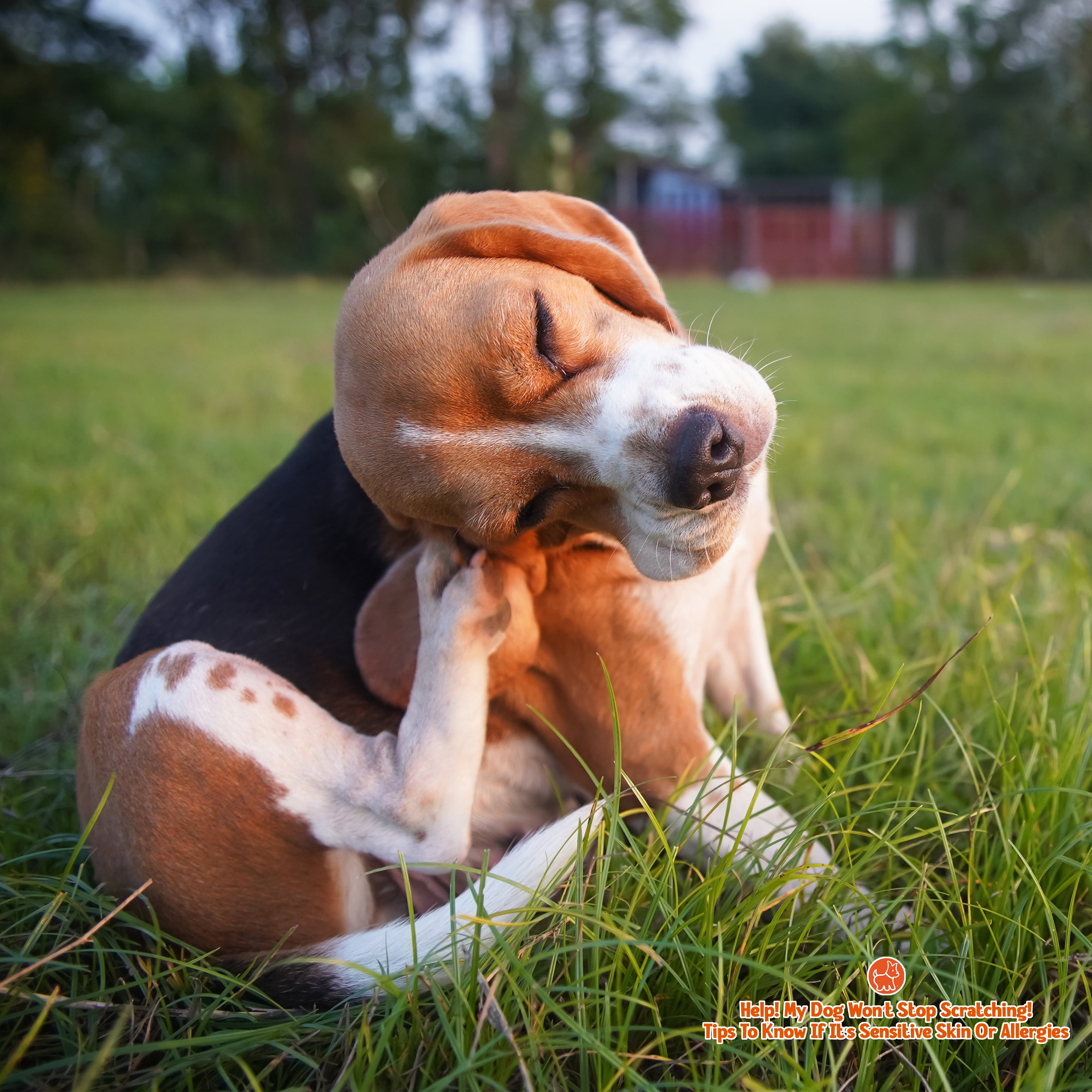If your pup has allergies or sensitivities, fear not! There are products available that cater to those specific needs and steps you can take to help your pup!
Here is a list of common causes of skin irritation in dogs:
- Parasites
- Food Allergies
- Flea Allergy Dermatitis
- Dog Food Allergies
- Dermatitis
- Skin / Ear Infections
- Anal Sac Disease
- Contact Irritants
- Stress or Boredom Resulting in Excessive Licking
- Coat that is Dirty or Matted
- Moisture trapped in the coat from swimming or bathing.
How Do I Know If My Pup Has Sensitive Skin Or Allergies?
Your dog will try to tell you if it is suffering from allergies; or at least their skin will! Common indications of allergies that you can see on your pup’s skin include rashes, redness, lesions, hives, hot spots, crusty texture, fur loss, or even secondary infections resulting from excessive scratching and licking. Take notice if your dog overgrooms itself, particularly on the sides, belly, elbow, or groin as it may be a sign of general allergies.
Some signs of allergy or sensitivity may be more localized on specific body parts depending on the cause and nature of the allergen. For example, your pup may begin rubbing its head and face against the furniture or carpet if it is exposed to an allergen on its face. Specifically, look out for fur loss and redress around specific and sensitive areas of exposure such as the eyes, muzzle or paws. If your pup seems particularly bothered by its ears, take a peek inside them and notice any extra wax build-up, redness, or odour. If your dog has watery eyes and is sneezing, it may have an allergen in its eyes or sinuses.
Allergies Caused By Food
Don’t forget to read the label on your pup’s food as food allergens are more common in pets than one would think. Did you know that chicken is one of the top dog allergens? This is difficult because chicken is a very common ingredient in a lot of dog foods.
Something that many people don’t know is that we have a great policy in place when it comes to dog (and cat!) food. If you buy a bag of food that doesn’t agree with your pet (whether it’s because of allergies or picky eaters!), you have 30 days to bring the bag back and exchange it for something that works for your pet! (Exchange must be within 30 days and have no more than 25% of the bag used. Policy applies for an exchange only, not a refund. Subject to change. Terms and conditions may apply. See store for details). Our Pet Counsellors will be happy to assist you in finding a food that works best for your pet!
One of the most common symptoms of a food allergy in dogs can be skin irritation, so it’s important to consider this if your dog develops a new rash. At Petland, we carry multiple brands of dog food that offer limited-ingredient diets for this specific reason. A limited-ingredient diet is a diet that has only one protein source and one carbohydrate source, making it a great choice for dogs who have allergies and sensitivities and helps you isolate what the allergen might be in your pet. You can find the limited-ingredient diets that we carry online here.
All Dogs Need a Bath
Bathing your dog once every 4-8 weeks is part of its general health and well-being. What do you do if your pup has skin allergies or sensitivities? Don’t worry, there are shampoos and conditioners for that! While shampoos and conditioners may not cure the issue, they definitely aid in providing some relief to dry and itchy skin. A good general rule for treating your pups itchy skin is to look for products with soothing ingredients such as oatmeal. Something worth trying too would be a very gentle formula such as Tropiclean OxyMed Medicated Oatmeal Treatment. Medicated shampoos provide fast relief of itching and soothe common skin conditions.
Another great shampoo option that is not medicated but features natural and soothing ingredients is Le Salon Soothing Shampoo For Dogs. This shampoo is designed to clean your pup while soothing itchy spots.
If your dog’s sensitive skin seems to be a recurring issue, you will need a hypoallergenic shampoo that acts as a long-term solution while simultaneously providing fast-acting relief for irritated skin. A great option is Soos Pets Natural Hypoallergenic Shampoo. This shampoo is specially formulated for dogs and cats with allergies and for pets with sensitive skin or chronic skin conditions. It provides fast-acting relief for irritated skin and is enriched with natural antioxidants, natural antibacterial agents & antiseptics.
Soos makes a Hypoallergenic conditioner too! This conditioner is a leave-in conditioner that Penetrates hair and skin to deeply hydrate. Hydration is excellent for sensitive, dry, and allergy-prone skin.
Hot Spots
Hot spots (also known as “pyotraumatic dermatitis) are a common skin infection in dogs and tend to affect dogs with thick or long coats. Hot spots are usually caused by a bacterial infection that blooms on a previously affected area (AKA an area that your dog already has irritation). Because hot spots are an infection, the best way to treat them is with an antibiotic, which requires a visit to the vet. However, there are products that you can use to help alleviate symptoms of hot spots. One of our favourite products is the Skouts Honor Probiotic Hot Spot Hydrogel. Why probiotic? Good bacteria serve as a natural defense against the environmental damage and inflammation commonly associated with excessive shedding, itching, dryness, infection and odor. When applied to the skin, probiotics support the good bacteria that naturally calm inflammation and prevent bad bacteria from taking over.
Take care of your dog’s skin and coat, and it will be a happy pup! Petland Canada has all of your shampoo and conditioner needs as well as helpful staff and great prices. Instore and online, we will see you there!



